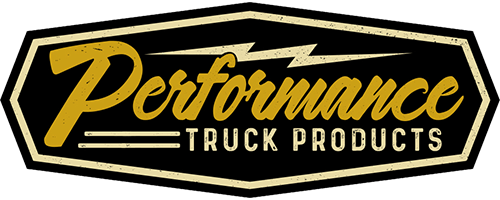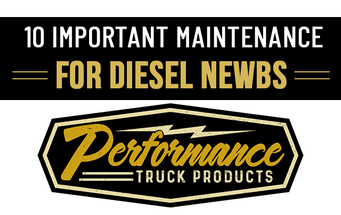Posted by Travis Harshaw on Sep 9th 2019
10 Important Maintenance Tips For Diesel Newbs
Got a diesel truck? Congratulations! There’s a lot to know about owning and maintaining a diesel truck, and sometimes it can be difficult to find a place to start. That’s why we're here.
We’re going to clue you in on ten of the most important maintenance tips to ensure maximum efficiency and life expectancy.
1. The Air Filter Must be Clean at All Times
Since diesel engines use a lot more air than gas engines do, it’s important to keep a close eye on your air intake. You want to ensure that your diesel engine gets enough clean air. Some manufacturers install electric sensors that will notify you when it’s time to check or replace your air filter.
If your truck doesn’t have a sensor, you can install a plastic indicator on the side of the air filter housing. Its color will change when the air filter becomes too dirty to function properly.
Please note: If your air filter gets clogged, it can get sucked right into your turbocharger. That's bad (really, really bad). Don't mess around with this task.
2. Diesel Fuel Filters Need to be Changed Frequently
Diesel fuel is a lot more likely to be contaminated than gasoline, so the fuel filter in a diesel vehicle is pretty important. The best way to make sure your vehicle operates at peak efficiency and power is to replace your fuel filter more often, sometimes even ahead of the recommended schedule.
Most likely your engine has sensors that will notify you when the fuel filter becomes clogged. Replace your fuel filter as soon as your truck gives you this warning because ignoring this problem can lead to engine damage.
3. Always Check Your Oil Level Between Oil Changes
Your diesel engine will burn oil under normal operation, and the only way to maintain an adequate oil level is to monitor it closely. To properly check your oil:
- Let your engine cool for at least 30 minutes.
- Make sure your truck is level.
- Pop the hood and check the dipstick.
- If the oil needs to be replenished, check the owner’s manual for directions.
4. Purge Water From Your Fuel System
Here’s a fun fact: diesel fuel can contain water. Many modern diesel engines come equipped with water/fuel separators; however, it’s a good idea to check your owner’s manual to see if your truck has one.
If not, you need to remove the water manually. Your owner’s manual should have instructions on how to do this. There’s also the option of bringing your truck to the nearest service facility, where they'll perform it for free or a small disposal fee.
5. Black Smoke Isn’t Always Okay
Rolling coal might be fun to some, but excessive black smoke could mean bad news, particularly injector or fueling issues:
- Worn-out injectors
- Dirty injectors
- Faulty injection timing
If you’re experiencing excessive black smoke, use a diagnostic tool to figure out which injector is the culprit or if their are any codes. You may need to take your truck in to a good diesel technician so they can properly diagnose and fix the issues.
6. Avoid Long Trips During Your Engine’s Break-in Period
It takes a while to break in your diesel engine. More specifically, you have to drive between 500 and 1,000 miles before your engine is fully broken in. Many manufacturers recommend only driving in stop-and-go traffic, avoiding sustained speeds, and not towing anything during the break in period. Properly breaking in your diesel engine will help your truck improve its power and efficiency over time.
7. Monitor Your Cooling System Closely
Your diesel engine is not like a gas engine. You can’t just shut it off and let it cool for a few minutes when it overheats. Often times, an overheated diesel engine is damaged beyond repair. That’s why it’s so important to actively prevent your engine from overheating.
The best way to do this is to watch and maintain your cooling system. Monitor your coolant levels and make sure your coolant filter is always clean, replacing it when needed.
Additionally, it's a great idea to let your engine idle a minute or two before you shut it off, especially if you've been working it hard.
8. Warm Up Your Engine in Cold Weather
Diesel engines and cold temperatures don’t mix. When the temperature is below zero degrees, diesel engines can be hard to start. That’s why they come equipped with a block heater. Your owner’s manual should tell you where yours is located. As long as you plug your block heater in to keep your engine warm in freezing temperatures, your diesel truck shouldn’t have a problem starting up.
9. Try to Keep the Fuel Tank Full
To prevent moisture build-up (see #4), keep the fuel tank full, especially if you don’t drive your vehicle often. You don’t have to do this all the time, though, because many diesel vehicles come equipped with filters and breather vents to prevent moisture build-up.
10. Don't Idle Your Engine for Long Periods
Prolonged idling of diesel engines is not only bad for the environment, but it also cuts your engine’s lifespan. It causes insufficient lubrication on the piston wall, leading to piston and cylinder block scoring.
In the "old" days, diesels needed to run constantly to prevent fuel from gelling. However, this is NOT a concern on a modern diesel. If you let your engine idle for extended periods, you're just wasting fuel and reducing your vehicle's life.
If you practice the above ten tips on a regular basis, your diesel truck should last a long time.


